Speculative Fiction Writer’s Guide to War, part 5: Psychology of War: Essential Fears
Especially in epic fantasy stories, human beings or demi humans like elves or dwarves are often portrayed as fighting to the death with total disregard to fear. Creating larger-than-life struggles is part of the appeal of epic literature, but an author should be aware of what takes place behind the scenes in a warrior’s psychology, of what’s normal, to be able to better portray the abnormal. Because people don’t usually fight until the death–they fight until the flight or the surrender.
Many people are familiar with the so-called “fight or flight” response, a state of stimulation caused by danger that can alternatively drive a person to fight or to run away. But as documented in the book On Killing, when fighting members of their own species, not only human beings, but all social animals in creation have a third response–to surrender.
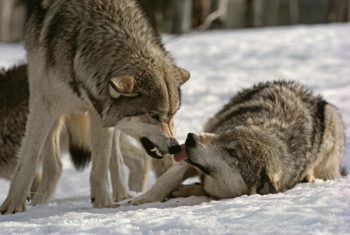
Who is the alpha here? (Credit: Living with Wolves)
So wolves in a pack fighting to be the dominant member of the group–the “alpha”–don’t usually fight until one is dead, but until one surrenders or yields dominance, which is signaled in a specific way by members of canine species, i.e. lowering its body, tucking its tail, and/or exposing the belly. Human beings also have a surrender response as part of what I would call the “common operating software” that the human brain shares with many other living creatures. It’s strongly influenced by culture, but humans usually signal quitting combat by raising up empty hands, showing themselves weaponless.
Essential fears
Fear or a sense of being intimidated are the essential emotions that trigger the surrender or flight responses. And there are specific stimuli that trigger this reaction in human beings. Our species tends to be intimidated by opponents who are taller. Which gives a reason why Greek, Roman, and other soldiers wore plumes on the top of their helmets or wore tall hats–in addition to making someone easier to identify on the battlefield, such devices make a warrior appear to be taller. Looking taller didn’t help a soldier fight better in the slightest, but it did increase the chances an enemy will feel the urge to run or surrender. I believe ancient warriors understood instinctively that a helmet plume helped them fight, without having identified the reasons why. Note that tall hats and plumes disappeared when weapon effectiveness from a distance made their payoff in intimidation not worth how much easier a target a soldier using such a hat became. Note also how often speculative fiction has focused on tall warriors—from the cyclops of Greek myth, to giants, to Mobile Suit Gundam, Pacific Rim Jaegers, and Godzilla.
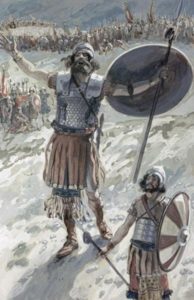
Goliath (Credit: James J. Tissot–public domain)
This understanding adds depth to the Biblical account of David and Goliath. Goliath’s size not only made him more powerful, it made him more intimidating. Note that the Bible records that Saul had been in many battles and was a noted warrior long before Goliath challenged his army to send a champion to single combat. Yet in spite of his battle conditioning, Saul had no desire to face off against the Philistine giant himself. This probably went beyond a calculation of the threat the giant posed. The feeling tapped into natural fears–Saul seems to have found Goliath’s height intimidating on a level deeper than reason. And David marked himself as a hero by his ability to overcome that instinct through his confidence in God.
Likewise early firearms, while they had the ability to do devastating damage, were difficult to aim, so had a practical range less than that of bows and crossbows of the same era. Not only was their range more limited, their rate of reload made them slower to operate that crossbows and much slower than bows. In terms of the ability to kill most enemies, bows or crossbows were significantly more effective. But as a weapon of intimidation, firearms that roll like thunder and shoot flames like mythical beasts (the word “gun” is short for “dragon”) were intimidating to enemies in a way arrows could never be. Early guns triggered panicked flight and open handed surrender to such a degree that the gun was far more effective on the battlefield than bows and arrows, even though it was an inferior killing weapon at first. In other words, it replaced the arrow as the distance weapon of choice primarily for psychological reasons. (Note this isn’t true with cannons–cannons actually do more damage than the catapults they replaced.)
Any weapon or method of fighting that taps into instinctual human fears has a greater chance of inducing a flight or surrender response. Some of the main things that humans are afraid of include falling from heights, burning in fire, drowning in water, and loud noises. One of the reasons a cavalry charge was generally effective against foot soldiers came from the intimidation value of the charge itself, horses taller than footmen galloping their direction, their hooves making a roar like thunder. This often caused men on foot to break and run, or surrender, before the horsemen even reached them.
Human beings can be so intimidated by an opponent, especially an opponent with a reputation for ruthlessness and torture of enemies, that they surrender even before any battle has begun. Note that Sun Tzu believed that height of strategy to win a battle based on intimidation alone (The Art of War 3, 2).
If it comes to an actual battle, warriors have proven more likely to surrender rather than run when attacked from the front and behind simultaneously, i.e. when surrounded. When a route of escape is evident (as Sun Tzu recommended a victorious army provide, The Art of War 7, 36), there is a higher tendency for an intimidated army to run. Running triggers an instinctual response in opposing forces to chase after those fleeing the battlefield (like a wolf chases prey or an angry, territorial bull chases intruders on his terrain). Many warriors in ancient and medieval battles were killed after they psychologically broke and were in the process of running away. Ancient Roman armies employed cavalry primarily for hunting down and killing enemies fleeing from the battlefield, rather than for direct combat.
Breaking morale on the battlefield
So the clash of two armies on a battlefield, with both lined up against one another, was not really about who killed the most enemies. The battle almost always ended when one side perceived they would lose and morale broke. And often, especially in ancient and medieval times, more people were killed on the battlefield after an army broke and ran than during what we would consider normal combat, as their enemies chased them down and killed them as they fled.
As a general rule, troops who are poorly-trained are more likely to break. Troops that are highly disciplined and trained over and over again that surrender is a dishonor, surrender far less often, but still do. For example, while all Japanese troops in WWII believed giving in to an enemy was a grave dishonor and many refused to do so, a certain percentage still actually surrendered.
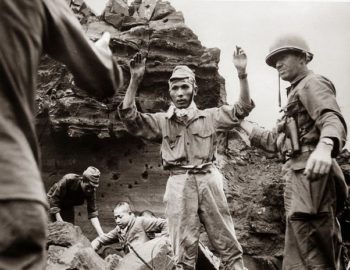
Japanese troops surrendering (Credit: Quora)
Soviet and German troops facing off against each other in WWII had a greater likelihood of fighting to the death than is normally the case, not only because of soldier discipline, but because of the high likelihood of troops being killed upon surrender by the other side. A “take-no-prisoners” approach stiffens an enemy’s resistance to giving up. But even so, soldiers under the strain of battle, even when they knew surrender would likely result in death, even if they were highly disciplined and had been ordered to fight to the bitter end, even then still surrendered sometimes. That’s how strong the surrender instinct is in a terrified human being.
Remember when writing battles that armies don’t fight like video games, with the winner strictly determined by who survives after each side doing the maximum physical damage they can. In almost all battles, the side that lost was the first to break psychologically (which often but not always corresponded to the side taking the most damage), which caused them to surrender or to run away.
Essential fears, morale, and battlefield responses in Prince Caspian
Here are some illustration on the topic. The psychology of warfare is a broad topic with a lot of possible rabbit holes. Like a good engineer, I feel it useful to distill and restate, then proceed with application (sorry fans, no X-Y plots this week). First, Travis P described 3 possible reactions to the stress that comes with combat: Fight, Flight, or Surrender. Second, we provided several explicit examples of factors that may influence each of those reactions, either encouraging the response or dampening it, by tapping into a culture/species’ core fears.
It was an age of lost memory, when the hard people of Telmar came ashore and took control of portions of the ancient kingdom of Narnia. With no Son of Adam or Daughter of Eve to sit upon the throne at Cair Paravel, it looks inevitable in hindsight. But the Telmarines are not ignorant. They know to fear what lives in the woods. Myths and fairytales to frighten children, beasts and demons who haunt that primeval land.
Sound familiar? C. S. Lewis provides us an interesting context for warfare in Prince Caspian, the second book in series order of the Chronicles of Narnia. The Telmarines are castaways who found Narnia by chance but don’t fully appreciate or understand the native creatures, living in an awkward stalemate against further expansion. Telmarines fear the Narnians, fear the legends of the Narnians, even as history passed into legend. That changes when Prince Caspian escapes his evil uncle Miraz and ultimately rises to lead the Narnian forces against Telmar, alongside the returned Kings and Queens we all love.
Both book and movie describe battle quite well, though I will probably rely on the movie for visual effect. After a failed attempt to stop King Miraz in his castle, the Narnians prepare for a last stand at Aslan’s How and the Second Battle of Beruna. King Miraz shows no fear, nor do his nobles appear to, when faced with these legends come to life. His soldiers though… They appear stalwart but have some indications of fear leaking through. The primary weapons to be used against the Narnians are all stand-off: catapults, trebuchets, and ballista. Best to cause damage from afar rather than close with the enemy. They wear masks to intimidate their foes, but maybe it is to give them a sense of equality when faced with minotaurs, centaurs, fauns, and the like. “We are dangerous too” it seems to say.
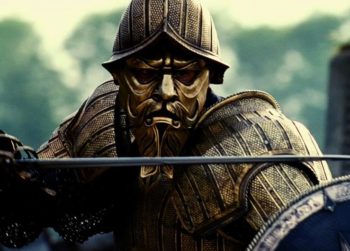
Masked Miraz, dressed to intimidate (Credit: WikiNarnia)
Before force-on-force battle begins, King Peter and King Miraz face off in single combat, each resplendent in their fine armor. Miraz’s high crest, golden scowled mask, and armored, broad shoulders show a man trying to intimidate his enemies with size. Narnia has similar tactics, with the King’s marshals chosen for size: a bear, a giant, and a crested-helm-wearing centaur already too tall and decked in steel. Who would stand against that?
After treachery ends the single-combat and opens the battle between armies, we notice that the Narnians, a mix of old enemies from the First Battle of Beruna, do not appear to significantly impact the Telmarine soldiers. Maybe some of this happens in the periphery, but by the by, most of the human units fight with coordination and skill. Maybe the Telmarine training regime, combined with a strong desire for revenge against Narnia’s earlier irregular warfare tactics, have caused the soldiers to deaden their flight response.
This changes once the tree show up. When the dryads awaken and the trees come to defend the Old Narnians, Telmarine soldiers flee. We witness some visual evidence of the trees grabbing soldiers on the run, whether because they were easy targets or because, being on the field, they were still considered combatants, we don’t know. The commanders urge their troops to fall back to the river ford, a place where a second stand might be accomplished. It’s hard to distinguish troopers running from tree roots from those conducting a calculated retreat to stronger positions.
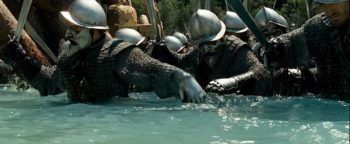
Telmarine fear of water (Credit: iCollector.com)
Once the river god destroys the bridge across the Ford of Beruna, escape is cut-off for the Telmarines and the soldiers surrender. We witness the expected reactions: hands raised, weapons laid down. We also witness a form of calculated surrender later, when Aslan allows any Telmarines who wish to start anew to leave Narnia for the land of their ancestors. Give the adversary a line of retreat, make it appealing, and they’ll likely take it. Narnia ensures future peace by weeding out any who might later be tempted to stand against the natives in retribution (my martial analysis says… I know Aslan authentically wants them to start anew and prosper).
For authors, I believe an important takeaway is in how we portray the difference between humans fighting humans, and anything other than that. How will people of different cultures, or creatures of different species and natures, act when pressed into battle against one another? In general, for the human race as created, we don’t like killing each other and will take alternate paths out of danger when possible: flight or surrender being preferable to fighting against sorry odds. However, against an adversary not like us, against a cause that will lead to death regardless, you may find well-trained warriors who will press the attack and fight until the end. It may also be a function of degree; the more alike we look, the more likely we are to react in the same manner. Difference may be the key to driving a sacrificial attitude. We might surrender to an elf but press on a hopeless attack against orcs. Alternately, a robot or AI-empowered force might be programmed to never make that decision and always fight through to the logical endstate. How can you flip that? The Machines of The Matrix realize they must ally with the humans to survive a greater third-party in Mr. Smith. In Bright, we see tension between elves, men, and orcs in a modern setting where all three live in the same society and find the main characters navigating that complexity. You have the opportunity to provide the logic of combat responses in any created beings, and have the responsibility to guide your reader into an understanding of how that logic plays in your world.































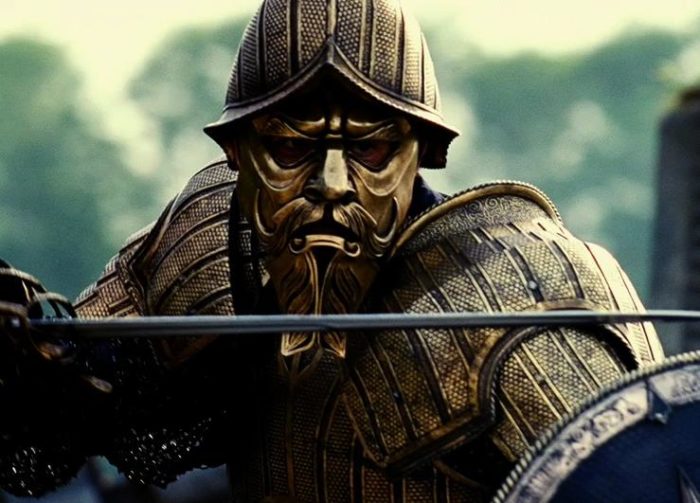
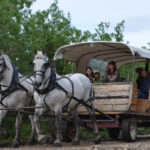
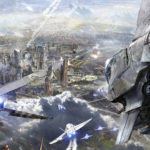




Kind of reminds me of a comment my Dad made while we were watching Lord of the Rings. He wondered why the ring wraiths bothered using those dragon things to fight when the dragons were only scooping up one or two people at a time to kill. I thought about it and decided that it was primarily a psychological thing. No one knew who the dragons would pick up, so when they swept through the area, the soldiers scattered and became terrified.
Of course, there are other uses, such as giving the ring wraiths the ability to survey the battlefield or pass messages along to subordinates quickly.
One thing that seems to be a factor, at least in fantasy battles, is a matter of the unknown or something that can’t be fought. If an army of scary looking fantasy creatures comes along, one that has never been seen before, their enemies might be like ‘Oh no, ghosts!’ and retreat. But after the enemy learns that the scary creatures aren’t ghosts at all, and learns how to defeat them, making them a known factor rather than an unknown one, the enemy is less likely to retreat from the scary creatures from then on.
As for things that can’t be fought…things like the ground crumbling under one’s feet are an example. Or things like the ring wraith dragons and the trees in Prince Caspian. Of course those last two can be fought with the right equipment and preparation, but when they first swoop in people are just trying to get away from them because they’re big and fast and the soldiers are afraid and instinctively run because they don’t know how to fight them immediately.
I would actually say that the Peter Jackson movies failed to capture the dread that the Ring Wraiths created, their psychological impact. Oh, they don’t seem like nice guys, but the 1978 animated Lord of the Rings, while full of serious problems, made the Ring Wraiths terrifyingly creepy in a way I think Jackson failed to do.
In fact, it’s just so common for the effects of morale to be missed by movie makers, including in fantasy films. A much more realistic take on battles is found in the Bible–which consistently portrays people fleeing in the aftermath of battles and being hunted down. Example, Judges 4:15-17.
This post is probably more important than most people reading it realize. It’s just impossible to account for how battles turn out without thinking about morale and psychological impact.
Great point Travis. I continue to prefer the animated version; agree that interpretation of the Nine was very well done. In my opinion they also got Aragorn closer to my internal interpretation from the books.
Funny how after the fact I keep rethinking of new examples from literature and cinema, “Good example…Great example…awful example…awful example…not even close…OK example…” While Hollywood can get it close, or get it really far off, I also think of the purpose they are trying to achieve, and all too often it’s not realism but excitement and entertainment.
Travis, I agree that sometimes Hollywood doesn’t care about realism–but I think at times they are trying for realism, but have no idea what that looks like.
In fact, I’d say that’s what you and I are really hoping to cure with these posts. It’s one thing if an author deliberately chooses to abandon all sense of reality for the sake of artistic expression. We may or may not agree with such a decision, but at least we can understand it.
However, it’s tragic for a story to attempt to be realistic and then fall short of that goal due to lack of understanding of what actually is real.
Great thoughts Autumn! I feel the same as you about the Nine. Steeds that give them amazing advantages (perception of the battlefield, speed, a mount that fights back) and one that compels fear in their foes. Maybe it’s because of their inhumanity that the Nine never stop in front of Gondor and just wait for the people within to give up. Their only logical choice is to run.
I also agree that fear of the unknown is a significant driver in good fantasy and sci-fi. I’m still completely freaked out from watching Annihilation and fear the woods; too much unknown. We are truly speculating when we mix humans, especially humans in our world’s settings & environs, with the unknown. In hindsight I think I should have let my characters stew with their emotional responses more in my current series: 12th century knights, combat veterans, thrown against an army of demons broken loose into England. I may use this example in the future, but the latest season of Game of Thrones shows us the expectation of dragons. All through the early books people know there were dragons, hundreds of years ago, and there are skulls underneath King’s Landing, but no army has ever faced on (and history says every army that faced one burned). So when 3 get unleashed on Westeros, it’s a huge, HUGE, impact on the morale of the troops and the storyline.
Make you realize just how much it took for Shadrach, Meshach, and Abednego to walk into a fiery furnace. I think HBO made a misstep in having two of the nobles refuse to surrender and get torched. Nope. When faced with a dragon, you’ll bend the knee. At least if it’s for a temporal cause.
Demons would probably definitely have an impact on human emotion, though I’m biased toward saying that since I write them a lot. If they’re actually a genuine first generation demon(the original angels that got kicked out of heaven) and trying to be intimidating(instead of trying to deceive people) yeah, they’d probably be downright terrifying, regardless of whether they’re the ‘ugly’ version of demons or the ‘cool/attractive’ version. Part of it probably depends on the psychology and behavior you chose for your demons, though.
And yeah, people underestimate what it’s like to be faced with an actual threat. Fear can be overcome with the right psychological conditioning(whether it be cultural, based in personality, life circumstances, or combat training) But it’s difficult, or even unpredictable as to who can overcome their fear enough to face it.
Though I suppose everyone’s fear is different. I wouldn’t skydive unless my life depended on it, but other people quite happily go into careers that expect them to skydive all the time.
The woods one is fun. I love the forest, which is why I write in forest settings a lot. But if you’re out in one in the middle of the night where it’s pitch black and deathly quiet…yeah, freaky.
I think specific individuals showing great acts of courage, including facing up to a dragon, is realistic enough. Though rare in practice, such courage happens.
But when you consider how even if everyone is laughing, a human is much more likely to laugh, too, or if everyone is crying, a human normally feels sad–when everyone is terrified, running in panic, that puts a tremendous pull on even a courageous human being to do the same thing. Crowds of soldiers in ancient and medieval battles, once morale broke, often panicked at a level that’s hard for us to imagine.
I remember reading an inscription of an Assyrian emperor (I don’t remember which one right now), talking about the chariots of his enemies fleeing from him after they lost a battle. He mocked them specifically for the “dung” that flew from their bodies as their chariots raced away…i.e. they were so terrified, they lost control of their bowels. That’s something that can actually happen, but which fantasy writers rarely think of.
I appreciated Grossman’s discussion of pre-combat responses:
“In the lower abdomen in every human being is a toxic waste site,” he says. “The body’s response is to dump that toxic waste before a life and death event, because if there’s trauma to the abdomen that stuff will leak out and infect the wound. So, before the event, there’s often stress diarrhea.”
I know of no fantasy writer who captures that type of response, before or during combat, very well. Maybe some of the Glen Cook I’ve read.
It’s probably one of those things where people don’t write about it even if they know about it because it either sounds gross or too comical for a serious situation.
The closest thing I usually hear to that in stories is people being like ‘Ha, they p*ssed themselves!’ I think that happened in Wolf’s Rain, actually. Not in a battle, but when one of the humans saw a character turn into a wolf or something. It’s been a long time since I saw it, so I don’t remember for sure, and it may have only been in the dubbed version. Wolf’s Rain is a good anime, though. You’d probably like it, assuming you haven’t seen it already.
I haven’t, so thanks! Always looking for a good anime recommendation… I’ve been lost since finishing The Count of Monte Cristo.
The mention of the “intimidation factor” reminds me of the Polish winged Hussars. Their uniform was highly impractical but it looked fearsome in large numbers and made quite the racket.
Hussars are a great example! Though there are lots of examples–the Hessians who fought in the American Revolution (already taller on average than most Americans), wore very tall, gold-colored hats…
Also reminds me of the Potsdam Giants, though purely ceremonial, all selected/captured/bred for height, then add to that a height-enhancing uniform kit….
Two things. I think that also influencing the fight or surrender part is unit cohesion and camaraderie. If someone is someone you consider a brother or sister, you will be influenced by what is best for them as well. That makes you fight harder, but also might, depending on your rank and authority, make you consider surrender, especially to non-kill em all enemies.
Also, discipline and training made me think of something. During the Revolutionary War, Washington despaired of winning with his (to use a term tv tropes likes) ragtag group of misfits. They were untrained, undisciplined, ignorant on the use of weapons in a military context, so on. Washington fought fire with fire, so to speak, and hired the Prussian military man Baron Friedrich von Steuben, to whip them into fighting form. Amazingly enough, he succeeded. Granted we still would have lost the war without other powers’ aid (especially France), but we’d have likely been screwed before then without Steuben’s training.
Alan, great points!
In fact, we intend to address the issues of unit bonding and training on military unit morale in future posts. But thank you for bring it up now.
Washington is a great example, by the way, of someone able to resist the panic that seized the rest of his troops. On more than one occasion his men broke and were running away as he stood in place, shouting at them to hold their positions and fall back in.
In the end, Washington’s own courage wasn’t enough to inspire his men. As you pointed out, they required better training to really improve.
Alan, double down on what T-1 says; hopefully we can provide a nice progression from individuals’ reaction, to small unit reaction, to larger unit reaction, to national/cultural/whole-force reaction.
Hopefully you’ll appreciate this: I was duty officer yesterday and watching our 24 hour “screener” for a summer training opportunity for the midshipmen to do a mini-training with the SEALS. Talk about selective: about a hundred or so trying out to narrow down to about 40-60 who will get downselected again after that to train with the SEALS, who might be competitive for about 30 spots to then go and actually attempt BUDS after graduation and becoming a real SEAL.
Anyhow, all of them are teamed up lifting heavy rubber rafts and giant logs, soaked and cold, sandy from crawling across the beach, and getting yelled at. The SEALS are looking for individual effort; they will only select those who have a real shot. But the whole thing is couched in the context of your boat team. If you fail the team, you’re done. Seeing that element (which all midshipmen are indoctrinated in) as part of the earliest selection process for an elite fighting unit is fascinating and really demonstrates the degree of teamwork necessary to prepare warriors facing some of our most challenging missions.